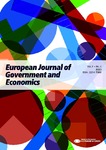Voting turnout in Greece: expressive or instrumental?

View/
Use this link to cite
http://hdl.handle.net/2183/25714Collections
Metadata
Show full item recordTitle
Voting turnout in Greece: expressive or instrumental?Author(s)
Date
2020Citation
Daskalopoulou, I. (2020). Voting turnout in Greece: expressive or instrumental?. European Journal of Government and Economics, 9(1), 26-45. https://doi.org/10.17979/ejge.2020.9.1.5426
Abstract
[Abstract The study analyses the micro-level determinants of voting turnout rates in Greece. In particular, we test for the effects of citizens’ socio-economic features, political participation, activism and trust as pointing to either an expressive or instrumental voting decision process. The analysis involves bootstrap logistic regression techniques and ESS data covering the 2002-2011 period. Evidence is found of instrumental voting in Greece as suggested by the effects of absolute and relative income and the effect of civic participation and trust variables. In addition, the profile of voters is differentiated in the pre- and during the crisis periods. The study makes a twofold contribution. First, the suggested analysis is unique for Greece, and thus it provides important information regarding citizens’ motives towards electoral participation. The second contribution relates to the study’s relevance to policy analysis and design. Results suggest that not only ideology but also the economic agenda might be an important predictor of electoral participation and consequently, legitimization and the quality of democracy in Greece.
Keywords
Voting turnout
Political participation
Activism
Trust
Economic crisis
Greece
Political participation
Activism
Trust
Economic crisis
Greece
Editor version
Rights
Atribución-NoComercial 4.0 España
ISSN
2254-7088






